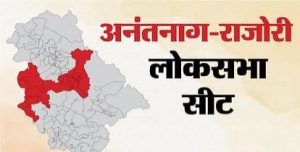
Jammu: The fate of 20 candidates will be decided by over 18.36 lakh voters of 03 Anantnag- Rajouri Lok Sabha seat in the last phase of Lok Sabha elections for the Union Territory of Jammu and Kashmir to be held on May 25.
According to the figures provided by the office of the Chief Electoral Officer, according to news agency Kashmir Dot, there are 18, 36,576 voters enrolled in 5 districts of Kulgam, Anantnag, Poonch, District Shopian (36- Zainanpora) and Rajouri of the PC, which included 9,33,647 male and 9,02,902 female voters and 27 third gender voters. Around 17,967 persons with disability and 540 persons above the age of 100 years will cast their ballots in the PC.
The Election Commission of India (ECI) has set up 2,338 polling stations across the Anantnag- Rajouri Parliamentary Constituency. Four election staff, including Presiding Officer will be stationed in every polling station. In total, more than 9,000 polling staff, including reserve will be deployed on duty. There are 19 Border Polling Stations in the districts of Rajouri and Poonch.
The polling will be held from 7.00 am to 6.00 pm and before that there shall be a mock poll in presence of polling agents. Voting will continue even after 6.00 pm, if the voters queue is still there in the Polling Station premises.
Every polling station will be provided with Assured Minimum Facilities (AMF) like Drinking Water, Electricity, Toilet, Ramp, Furniture, Verandah/Shed etc. Wheelchairs shall also be provided. The Ballot Units will also have a list of contesting candidates in brail script. Wherever required, there shall be separate queues for the senior citizens and specially abled persons so that they are facilitated in every polling station. Additionally, there shall be a voter help desk, manned by the concerned Booth Level Officer (BLO) to extend necessary help whenever required.
There will be 17 polling booths managed by women (called as pink polling stations), 15 polling booths manned by specially abled persons and 8 Polling Booths managed by youths. Also in order to spread message about the environment, there will be 15 green polling stations.
The purpose behind these special polling stations is to spread awareness among certain sections of society viz. women, specially abled, first time young voters and to motivate them to come forward and exercise their right to vote.
In order to facilitate the voters and also to increase voter turnout ratios, all voters have been provided with voter information slips with information like Polling Station name, date & time of poll, serial number of voter in the list, his full name, QR code but not the photograph of the voter. Hence, Voter Information Slips will not be allowed as proof of the identity of voters. Proof of identity will be any documents out of 12 documents, including EPIC. The BLO concerned has distributed 100% voter information slips.
The citizens can also view details of the Polling Station, Parliamentary Constituency, and get the contact details of the Booth Level Officer, Electoral Registration Officer among other services, through Voter Helpline App (VHA). This mobile app is available on the Google Play store and Apple App Store
The documents which can be used for voter’s identification in addition to Electoral Photo Identity Card (EPIC), included Aadhaar Card, MGNREGA Job Card, Passbooks with photograph issued by Bank/Post Office, Health Insurance Smart Card issued under the scheme of the Ministry of Labour, Driving License, (vi) PAN Card, Smart Card issued by RGI under NPR, Indian Passport, Pension document with photograph, Service Identity Cards with photograph issued to employees by Central/State Govt./PSUs/Public Limited Companies, Official identity cards issued to MPs/MLAs/MLCs, Unique Disability ID (UDID) Card, issued by M/o Social Justice & Empowerment, Government of India.
It is pertinent to mention here that the EPIC card is NOT mandatory for voting. If a voter has misplaced his/ her EPIC card, he/she can use any of the above-mentioned documents at the Polling Station.
With the aim of spreading awareness among the voters, Systematic Voters’ Education and Electoral Participation (SVEEP) emerged as a comprehensive programme aimed at reinforcing voter education and promoting active participation in democratic process. The need for SVEEP arises from the Election Commission of India’s unwavering commitment to ensuring the participation of every voter in this monumental celebration of democracy.